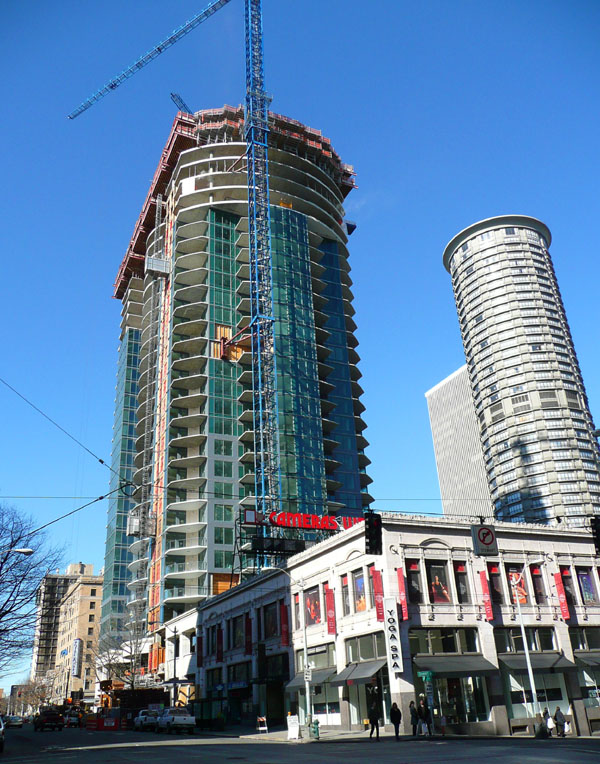Escala Is Latin For Embarrassment

No, it’s not finished yet, but enough is already known about Escala to easily justify its nomination for Seattle’s Most Embarrassing Condo Project. The array of qualifications is deep, but let’s start with the base of the building shown above. It has all the grotesque faux-classical decoration that you’d expect to find on the new strip in Las Vegas, which, fittingly, is the home town of The Midby Companies, Escala’s developer.
The project’s San Diego-based design architect Paul Thoryk waxes eloquent: “I call this design style contemporary heritage.” And in case you were wondering how so much profound inspiration could end up in one building, know that Thoryk “traveled around the world looking for ideas for Escala.” He could have saved a lot of time and money by traveling instead to any one of dozens of Florida beach resort cities that are littered with Escala-esque towers. Completing the picture, Bellevue-based architect of record MulvannyG2 supplied the “great local insight.”
According to Thoryk, the key programmatic driver for the project was to provide extra large units and balconies to make suburbanites feel more comfortable downsizing, because, “For all the talk about the joys of downsizing and how having fewer things makes life less complicated and more fulfilling, people naturally are attached to their belongings.” Apparently we all should be grateful that Escala will offer humongous condos because it will help the urban lifestyle become more accepted.
As can be seen in the photo below, the building is indeed loaded with scads of spatious balconies, some as large as 1000 square feet. All those exposed concrete slabs projecting out into space work great as heat fins to suck heat out of the building and increase energy consumption — no surprise that energy efficiency is not a high priority in a building like this. And if Escala actually is pursuing LEED certification, they’re keeping it quiet. A high-end project like Escala could be expected to have the budgetary flexibility to push the envelope on green design; and if the developers truly wanted to embrace the local culture, a green building would have been the obvious choice.
Add two letters to Escala and you get Escalade. Coincidence? Not likely that it escaped the notice of whatever branding firm it was that undoubtedly got paid an obscene sum to come up with the name Escala. One would assume it was perceived as a good association, but either way it’s just too perfect, because Escala befits Seattle about as well as an Escalade does: an ostentatious, oversized energy hog in a city of understated Prius admirers.
If you can stand more, go have a look-see at the piece of work that is the Escala web site. Bet you didn’t know that “once upon a place” Seattle had a “midtown.” Judging from the content of most of the photos, either they are planning to offer steep buyer discounts to female underwear models, or they are expecting an high-class escort service tenant. Remarkable, is it not, that the same advertising psychology applies whether it’s a multimillion dollar condo or a two dollar tube of toothpaste?
And behold Club Cielo! “Desire everything.”  Those who may harbor lingering doubts over if and when Escala will become Seattle’s resplendent nexus of high culture, worry not — high culture, like any other marketable commodity, can be readily manufactured and spoon fed.
Ultimately, what makes Escala most embarrassing of all is its timing. Escala is the love child of pathological excess, a manifestation of a world view that is in the process blowing up in our faces just as the project is set to make its grand debut.
Escala belongs in a bygone era: when Reagan and his acolytes preached trickle-down economics and government is the problem; when smug MBA’s high-fived each other over Gordon Gecko’s proclamation that greed is good; when Clinton deregulated while we all bought tech stocks; when everyone everywhere was getting rich just by owning a house; when pundits could get away with bloviating continuously about how the free market conquers all; when we ignored the glaring statistics showing that the ultra-wealthy were the only ones getting ahead because we deluded ourselves into believing we all were on the verge of ultra-wealth.
Demand for condos in Escala is likely to cool as downsizing suburbanites find it more difficult to sell off their estates. But I suspect there is still more than enough affluence in the region to fill Escala quickly enough for the developer to avoid serious pain. One can only hope that given the times in which we are now living, the fortunate residents of Escala might feel some little pang of embarrassment over their exclusive gated community in the city, some vague but troubling sense that success is little less sweet when it is not shared by the community as a whole.

